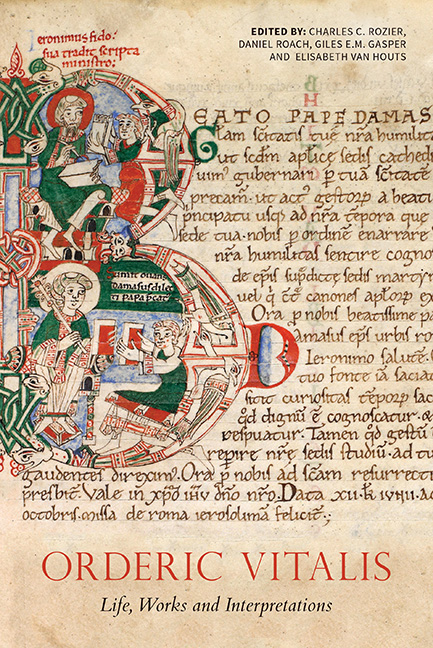Book contents
- Frontmatter
- Dedication
- Contents
- List of Illustrations
- Acknowledgements
- List of Abbreviations
- Chronology of the Lives of Odelerius and his Son Orderic Vitalis
- Composition of the Historia ecclesiastica
- Introduction: Interpreting Orderic Vitalis
- Orderic and his Father, Odelerius
- Following the Master's Lead: The Script of Orderic Vitalis and the Discovery of a New Manuscript (Rouen, BM, 540)
- Orderic Vitalis as Librarian and Cantor of Saint-Évroul
- Saint-Évroul and Southern Italy in Orderic's Historia ecclesiastica
- Orderic and English
- Inscriptions in Orderic's Historia ecclesiastica: A Writing Technique between History and Poetry
- Reading Orderic with Charters in Mind
- Orderic Vitalis and the Cult of Saints
- Orderic's Secular Rulers and Representations of Personality and Power in the Historia ecclesiastica
- Worldly Woe and Heavenly Joy: The Tone of the Historia ecclesiastica
- Orderic Vitalis, Historical Writing and a Theology of Reckoning
- Jesus Christ, a Protagonist of Anglo-Norman History? History and Theology in Orderic Vitalis's Historia ecclesiastica
- ‘Studiosi abdita investigant’: Orderic Vitalis and the Mystical Morals of History
- Meanders, Loops, and Dead Ends: Literary Form and the Common Life in Orderic's Historia ecclesiastica
- Orderic and the Tironensians
- ‘One single letter remained in excess of all his sins …’: Orderic Vitalis and Cultural Memory
- The Reception of Orderic Vitalis in the Later Middle Ages
- Appendix 1 Archaeological Investigations at the Abbey of Saint-Évroult-Notre-Dame-des-Bois
- Appendix 2 Descriptive Catalogue of Manuscripts Featuring the Hand of Orderic Vitalis
- Select Bibliography
- List of Manuscripts Cited
- General Index
Jesus Christ, a Protagonist of Anglo-Norman History? History and Theology in Orderic Vitalis's Historia ecclesiastica
Published online by Cambridge University Press: 25 October 2017
- Frontmatter
- Dedication
- Contents
- List of Illustrations
- Acknowledgements
- List of Abbreviations
- Chronology of the Lives of Odelerius and his Son Orderic Vitalis
- Composition of the Historia ecclesiastica
- Introduction: Interpreting Orderic Vitalis
- Orderic and his Father, Odelerius
- Following the Master's Lead: The Script of Orderic Vitalis and the Discovery of a New Manuscript (Rouen, BM, 540)
- Orderic Vitalis as Librarian and Cantor of Saint-Évroul
- Saint-Évroul and Southern Italy in Orderic's Historia ecclesiastica
- Orderic and English
- Inscriptions in Orderic's Historia ecclesiastica: A Writing Technique between History and Poetry
- Reading Orderic with Charters in Mind
- Orderic Vitalis and the Cult of Saints
- Orderic's Secular Rulers and Representations of Personality and Power in the Historia ecclesiastica
- Worldly Woe and Heavenly Joy: The Tone of the Historia ecclesiastica
- Orderic Vitalis, Historical Writing and a Theology of Reckoning
- Jesus Christ, a Protagonist of Anglo-Norman History? History and Theology in Orderic Vitalis's Historia ecclesiastica
- ‘Studiosi abdita investigant’: Orderic Vitalis and the Mystical Morals of History
- Meanders, Loops, and Dead Ends: Literary Form and the Common Life in Orderic's Historia ecclesiastica
- Orderic and the Tironensians
- ‘One single letter remained in excess of all his sins …’: Orderic Vitalis and Cultural Memory
- The Reception of Orderic Vitalis in the Later Middle Ages
- Appendix 1 Archaeological Investigations at the Abbey of Saint-Évroult-Notre-Dame-des-Bois
- Appendix 2 Descriptive Catalogue of Manuscripts Featuring the Hand of Orderic Vitalis
- Select Bibliography
- List of Manuscripts Cited
- General Index
Summary
As is well known, Orderic began his Historia ecclesiastica as a history of his own monastery, Saint-Évroul in Normandy, but progressively expanded it to what is almost a comprehensive history of contemporary Christianity, embracing a geographical area from Spain to the Holy Land, from England to Sicily, with, however, a strong focus on the Anglo-Norman world. At a certain stage of the composition, Orderic decided to place two additional books ahead of this Norman history (the original Book I became Book III, and so on) dedicated to apparently quite different themes. Most of Book I consists of a kind of Gospel harmony, an extensive life of Christ, followed by the history of the apostles up to the descent of the Holy Spirit; a brief world chronicle ordered by the reigns of the Roman emperors fills the chronological gap between Pentecost and Orderic's present time. Book II contains the (also very extensive) lives of the apostles and evangelists and a second chronicle, arranged chronologically by the pontificates of the Roman popes.
Modern scholarship has made little attempt to understand and explain the relationship between these two books and the rest of the work, and the fact that in Marjorie Chibnall's edition they appear only in the form of summaries and extracts has not helped to clarify their role in Orderic's general project. This chapter will stress the coherence of Orderic's work as a whole, and, by summing up and developing in greater detail some points of a previous study, I will show that by introducing Christ and some of the major figures of early Christendom as distinctive subjects, Orderic clarifies a meaning present in his narration from the beginning. I will suggest further that this meaning is not simply a question of moral judgement, but implies a fully coherent theology of history, which has been mostly neglected or misunderstood by modern observers because it was uncommon at Orderic's time, and does not correspond to our current conceptions concerning this matter.
In Chibnall's view the Historia ecclesiastica is made of two heterogeneous components which, however, ‘were loosely but persuasively joined by the metaphor of the vine’.
- Type
- Chapter
- Information
- Orderic Vitalis: Life, Works and Interpretations , pp. 260 - 283Publisher: Boydell & BrewerPrint publication year: 2016



